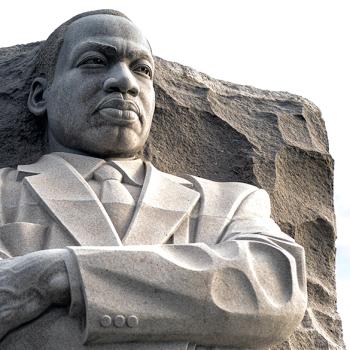Last Friday the Reverend Robert Jeffress smilingly told us that "Mormonism is not Christianity. It has always been considered a cult by the mainstream of Christianity." That means, of course, he reasoned, that no true Christian could vote for the infidel Romney—unless Barack Obama (who I think is a Christian by Jeffress's definition) were the only other choice.
I would like to see someone diagram the logic of that reasoning: Being a "real" Christian trumps being a Mormon, but being a Mormon trumps being a Christian if that Christian is Barack Obama. This looks suspiciously like some version of Arrow's Paradox.
A non-LDS friend asked me, "Aren't you offended?" No, I'm not offended. Nor am I angry. I'm not hurt. I'm certainly not surprised. I am, however, weary. I'm weary of religion, whether mine or someone else's, being a factor in an election when it is rarely, if ever, relevant.
I don't care whether Romney or Huntsman gets the Republican nomination. Frankly I hope neither of them wins, both because I don't agree with their politics and because I don't think it will help Mormonism. In any case, I hope their religion becomes and remains irrelevant to the question of whether to vote for them.
I'm also weary, of those who otherwise seem to be decent human beings, deciding that there is some universally recognized, strictly defined definition of "Christian"—always theirs, of course—and then concluding that since I don't fit their definition, I'm not a Christian. I'm supposed to go along with that. But I reject their definition as well as their right to decide what the word means.
It's as if "What is a Christian?" hasn't been at the heart of important theological and reformation debates off and on for about two thousand years. Or as if, though there have been those debates, the question is now settled: to be a Christian is to be what this or that theologian says it is.
The trouble is that the definition of Christianity has hardly been stable, not even now. Given the pronouncements that various evangelical authorities have made, sometimes "Christian" includes Catholics and sometimes not. Sometimes it includes the Disciples of Christ and sometimes it doesn't. Occasionally it even includes Mormons, though most often not.
I'm tired of those who pretend that their theological definition reflects what most people, even most people in evangelical congregations, mean when they say the word "Christian." I doubt it. Ask a dozen evangelicals at random what the word means and I'll bet dimes to donuts that most of them will say something that would implicitly include Mormons.
That isn't only true of evangelicals; it is true of everyone. Few have a carefully delineated definition of the term, and the ordinary definitions of Christianity with which most people, Christians and non-, feel comfortable would probably include Mormons. So, I'm tired of people using the difference between what they mean and what others hear to their rhetorical advantage.
They pretend that when they say "Mormons aren't Christians," they are saying the same thing that others hear, though they know they rarely are. They mean "Mormons don't fit our particular theological definition of Christianity." Their auditors mistakenly hear them meaning "Mormons are not what most of us think of when we say the word 'Christian.'" That difference between what they say and what others hear is seldom unintentional, and I'm tired of people using that rhetorical trick.
Like other Mormons, I believe in the Jesus of the New Testament: he was born of the Virgin Mary, and baptized in the Jordan River by John the Baptist. He preached the gospel and ministered to the poor and the ill, healing many. He was arrested by the soldiers of Pontius Pilate, then tortured and tried as a common criminal. He was executed by crucifixion, suffering for our sins beginning in the Garden of Gethsemane and ending only with his death. On the third day of his entombment, he arose from the dead, breaking the bonds of death for all humankind. After his resurrection he was seen by many who testified that he had risen. He ascended into heaven where he sits on the right hand of God as our Advocate and Intercessor.
If I didn't preface that description of my belief with "I'm a Mormon," few people hearing my declaration would doubt that I'm a Christian. It makes no sense that such a preface would make the rest of what I say non-Christian. Professor Jeffress and I may disagree about the theological explanations of divinity. But it is preposterous to say that we don't believe in the same historical person, Jesus, nor that we don't both believe that he is the Messiah. We are both Christians.
If I say "horse" and you say "horse" and we are both pointing to the same animal in a field, then we both mean the same thing, even if you believe that horses are related to cows and I believe they are related to unicorns. I doubt that what we believe about a word by way of explanation changes its referent.
So give me a break. I need the rest.
If you believe that Mormons are heretical Christians bound for eternal burning in hell, fine. You are entitled to whatever religious belief you want. But if you have to say something about Mormons, say that. Say what would be more honest, though less interesting: Mormons aren't the same kind of Christian you are. While that would attract virtually no media attention, it would have the virtue of being accurate.
10/13/2011 4:00:00 AM





